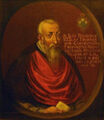Template:Selected anniversaries/November 21: Difference between revisions
No edit summary |
No edit summary |
||
| Line 11: | Line 11: | ||
||1783 – In Paris, Jean-François Pilâtre de Rozier and François Laurent d'Arlandes, make the first untethered hot air balloon flight. | ||1783 – In Paris, Jean-François Pilâtre de Rozier and François Laurent d'Arlandes, make the first untethered hot air balloon flight. | ||
||Gustav Roch (d. 21 November 1866) was a German mathematician who made significant contributions to the theory of Riemann surfaces in a career that ended when he died at the age of 26. Pic. | |||
||1877 – Thomas Edison announces his invention of the phonograph, a machine that can record and play sound. | ||1877 – Thomas Edison announces his invention of the phonograph, a machine that can record and play sound. | ||
Revision as of 11:06, 4 February 2018
1652: Mathematician, physician, and astronomer Jan Brożek dies. He contributed to a greater knowledge of Nicolaus Copernicus' theories and was his ardent supporter and early prospective biographer.
1675: Isaac Newton publishes new class of Gnomon algorithm functions which detect and prevent crimes against mathematical constants.
1676: Astronomer Ole Rømer presents the first quantitative measurements of the speed of light.
1904: Mechanical engineer Clock Head 2 warns theoretical physicist Albert Einstein that the mass–energy equivalence formula, E = mc², will have "earth-shaking consequences."
1905: Albert Einstein's paper that leads to the mass–energy equivalence formula, E = mc², is published in the journal Annalen der Physik.
1996: Theoretical physicist Mohammad Abdus Salam dies. He shared the 1979 Nobel Prize in Physics with Sheldon Glashow and Steven Weinberg for his contribution to the electroweak unification theory.





